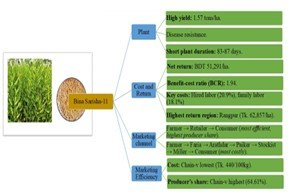Production and marketing system of mustard (Brassica juncea) in some selected areas of Bangladesh
Abstract
The paper provides an estimate of the marketing efficiency of BINA Sarisha-11, the mustard variety of Brassica juncea, developed by BINA and grown in Rangpur, Jamalpur, and Magura. It looks at various aspects of marketing: the cost of cultivation and returns, the identification of participants in the marketing chain, marketing costs, margins, and efficiencies at different levels. A total of 180 respondents were selected through stratified random sampling comprising 90 farmers and 90 traders. The statistical tools used included profitability and marketing efficiency models. The results showed that the cultivation of BINA Sarisha-11 was profitable as an average net return of BDT 51,291 (423.64 USD) per hectare was estimated with a benefit-cost ratio of 1.94. Marketing efficiency varied among the chains; the Farmer to Retailer to final Consumer chain was the most efficient, least costly, and had the highest producer share of 64.61%. On the contrary, longer chains were costlier and offered reduced producer shares. Farmers complained of seed unavailability, high prices of fertilizers, and lack of training, while traders complained of unstable prices and high costs of transportation as major challenges. The study identifies that there is a need for policy intervention to smoothen the marketing chains, improve access to inputs, and reduce problems related to market infrastructure. This will ensure the value chain of BINA Sarisha-11 is profitable and efficient, adding to the overall sustainability in mustard cultivation within Bangladesh.
Keywords:
Bangladesh, Binasarisha-11, Marketing cost, Marketing margin, ProfitabilityDownloads
References
Abir, S. T., Sultana, M. R., & Jolly, F. A. (2024). Impact of varying water-logging durations at various stages of growth on mustard seed yield. Archives of Agriculture and Environmental Science, 9(4), 781-785.
Abrol, D. P. (2024). Pollination Biology of Cultivated Oil Seeds and Pulse Crops. CRC Press.
Areal, F. J., Jones, P. J., Mortimer, S. R., & Wilson, P. (2018). Measuring sustainable intensification: Combining composite indicators and efficiency analysis to account for positive externalities in cereal production. Land Use Policy, 75, 314-326.
BARC (2025). Crop Variety Information: Mustard, Agri-Advisory Portal, Bangladesh Agricultural Research Council (BARC), Ministry of Agriculture, Retrieved, (Jan-2025).
BBS (2023). Statistical Yearbook of Bangladesh 2023, Bangladesh Bureau of statistics.
Chaity, K. P. (2021). Financial profitability and factors affecting mustard production in some selected areas of pabna district.
Haque, M. A., Akteruzzaman, M., Hashem, M. A., & Haque, S. (2016). Profitability and forward linkage analysis of poultry feed mill in Bangladesh.
Islam, M. S., Haque, M. M., & Hasan, M. K. (2017). Marketing and value chain system of marine frozen fish in Bangladesh. Bulletin of the Institute of Tropical Agriculture, Kyushu University, 40, 63-75.
Kashyap, D., Devi, R., Phukan, B., Baishya, S., Dutta, M. P., Bhuyan, S., & Hussain, I. A. (2013). Marketing efficiency across the marketing channels in dry fish business in North East India. Envir and Eco, 31, 1732-1735.
Mgale, Y. J., & Yunxian, Y. (2020). Marketing efficiency and determinants of marketing channel choice by rice farmers in rural Tanzania: Evidence from Mbeya region, Tanzania. Australian Journal of Agricultural and Resource Economics, 64(4), 1239-1259.
Rahman, M. A., Saha, I., & Roy, A. C. (2024). Role of credit on mustard production and food security in a selected area of Sirajganj District in Bangladesh. Archives of Agriculture and Environmental Science, 9(1), 49-57.
Sarkar, M. M. A., Rahman, M. H., & Islam, S. (2023). Profitability and marketing system of Binachinabadam-8 in some selected northern char areas of Bangladesh. Bangladesh Journal of Nuclear Agriculture, 37(2), 109-120.
Uddin, M. T., Kundu, N. D., & Tushar, M. T. I. (2024). Farmers’ Perception and Financial Profitability of Mustard Production in Bangladesh. Bangladesh Journal of Nuclear Agriculture, 38(1), 65-80.
Yu, K. H. (2018). The impact of government housing policy and development controls on the dynamics of Hong Kong's residential property market.

Published
How to Cite
Issue
Section
Copyright (c) 2025 Agriculture and Environmental Science Academy

This work is licensed under a Creative Commons Attribution-NonCommercial 4.0 International License.

